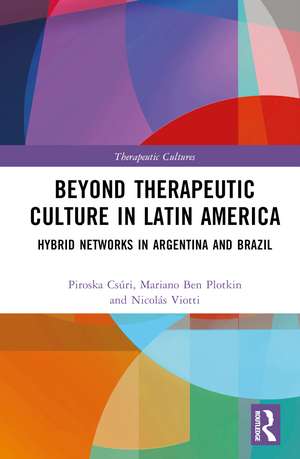Beyond Therapeutic Culture in Latin America: Hybrid Networks in Argentina and Brazil: Therapeutic Cultures
Autor Piroska Csúri, Mariano Ben Plotkin, Nicolás Viottien Limba Engleză Hardback – 30 noi 2022
Usually considered a global phenomenon disseminated from North to South, and associated to "modern" forms of "psychologized" subjectivity, "therapeutic culture" has become a key notion to understanding contemporary culture. However, this path-breaking research, grounded in a bottom-up perspective that follows specific therapeutic narratives, shows that the concept of the "therapeutic" should be extended to encompass a diversity of practices, both "secular" and "religious," "modern" and "traditional," that are deemed as therapeutic by the actors involved, although they are overlooked as such by most of the current literature. Pentecostal and Afro-Brazilian religions as well as New Age practices coexist and interact with "conventional" therapeutic techniques such as Psychoanalysis, conforming complex and hybrid therapeutic networks associated to different (also hybrid) forms of subjectivity. Although the book draws upon two cases from the "Global South," its theoretical conclusions are applicable to the analysis of the realm of the therapeutic at large.
The book is aimed at university students (both graduate and undergraduate) and at the general public interested in the notion of the therapeutic and, specifically, in Latin American culture.
| Toate formatele și edițiile | Preț | Express |
|---|---|---|
| Paperback (1) | 258.24 lei 6-8 săpt. | |
| Taylor & Francis – 27 mai 2024 | 258.24 lei 6-8 săpt. | |
| Hardback (1) | 866.36 lei 6-8 săpt. | |
| Taylor & Francis – 30 noi 2022 | 866.36 lei 6-8 săpt. |
Preț: 866.36 lei
Preț vechi: 952.04 lei
-9% Nou
Puncte Express: 1300
Preț estimativ în valută:
165.78€ • 173.88$ • 138.01£
165.78€ • 173.88$ • 138.01£
Carte tipărită la comandă
Livrare economică 01-15 aprilie
Preluare comenzi: 021 569.72.76
Specificații
ISBN-13: 9780367187026
ISBN-10: 0367187027
Pagini: 200
Dimensiuni: 156 x 234 x 17 mm
Greutate: 0.45 kg
Ediția:1
Editura: Taylor & Francis
Colecția Routledge
Seria Therapeutic Cultures
Locul publicării:Oxford, United Kingdom
ISBN-10: 0367187027
Pagini: 200
Dimensiuni: 156 x 234 x 17 mm
Greutate: 0.45 kg
Ediția:1
Editura: Taylor & Francis
Colecția Routledge
Seria Therapeutic Cultures
Locul publicării:Oxford, United Kingdom
Public țintă
Postgraduate and UndergraduateCuprins
Introduction: From therapeutic culture to therapeutic networks; 1 The theoretical framework: Therapeutic networks as assemblages; 2 The supply side of therapeutic networks: Mobilizing thick and thin actants for wellbeing; 3 On the demand side: Searching wellbeing through interaction with thin actants; 4 Actants and their complexity: Between thinning thick actants and thickening thin actants; 5 Parallel paths toward the autonomization of the self: Between religion and self-help; 6 Complex forms of mediation: Ontological brokers, translators, and bridges; Conclusions: Toward a new theorization of the therapeutic
Notă biografică
Piroska E. Csúri is a lecturer in Communication at the Universidad de San Andrés and teaches at the Universidad Nacional de Lanús and in the Postgraduate Program of the Universidad de Buenos Aires, Argentina. She is the co-editor of Structures in the Mind: Essays on Language, Music, and Cognition in Honor of Ray Jackendoff.
Mariano B. Plotkin is a researcher at the National Council for Scientific and Technical Research (CONICET) and Professor of History at the Universidad Nacional de Tres de Febrero. He is the author of Freud in the Pampas, among other texts on the history of Psychoanalysis.
Nicolás Viotti is a member of The National Council for Scientific and Technical Research (CONICET) and professor in FLACSO at the National University of San Martín, Argentina. His is the co-author (with Lucía Ariza) of the forthcoming volume Desconfianzas. Por qué ya no se cree en la Ciencia.
Mariano B. Plotkin is a researcher at the National Council for Scientific and Technical Research (CONICET) and Professor of History at the Universidad Nacional de Tres de Febrero. He is the author of Freud in the Pampas, among other texts on the history of Psychoanalysis.
Nicolás Viotti is a member of The National Council for Scientific and Technical Research (CONICET) and professor in FLACSO at the National University of San Martín, Argentina. His is the co-author (with Lucía Ariza) of the forthcoming volume Desconfianzas. Por qué ya no se cree en la Ciencia.
Descriere
By focusing on quantitative and qualitative research in Rio de Janeiro and Buenos Aires, this book expands on the notion of "therapeutic culture."






